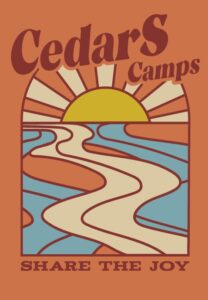PYCLs— 1) “NEW” RATHER THAN “YOUNG”. 2) START A SYNONYM PROJECT. 3) WHAT IS LIFE? 4) EVER BEEN STUCK IN THE MUD? 5) EVER LOOKED AT THE WORLD FROM “BENT OVER”?
CedarS PYCLs, Possible Younger Class Lessons, for the Christian Science Quarterly Bible Lesson:
“Life”
for July 17, 2022
by Kerry Jenkins, CS, House Springs, MO
kerry.helen.jenkins@gmail.com (314) 406-0041
PYCL #1: “NEW” RATHER THAN “YOUNG”.
I don’t suppose the little ones will care about this kind of detail, but I love thinking of “new” rather than “young”. You can discuss this by bringing in a new item, and an item that looks very old or worn. What’s the difference between “young” and “new”? With matter it’s not much different is it? You can’t take an old thing and make it brand new, though you can restore things to an amazing level. What if we are talking about ourselves? Can we make ourselves “young”? Society obviously tells us that we can take steps to look and feel younger, but they don’t actually make you younger. Is being young a worthy goal? All of this hinges on a mortal or material sense of being, of life.
If life in matter is where we are building from then there is no way to grow younger. But we can make ourselves new each day! Think together of a time where you were able to turn around a grumpy mood and refresh yourself rather than fall into further funk. Isn’t that a form of making yourself new?
What if we make it our mission each day to discover at least one new thing about ourselves—maybe one spiritual fact—and put that new thing into action.
For example, maybe we realize that we have all the qualities of compassion from Love and that we want to demonstrate this in an action today. We could do something as simple as pick up some trash from the road or sidewalk or a trail that someone dropped. You get bonus points for this compassionate act if you can think with love and not with judgement about someone as you do this act! There are literally infinite numbers of such acts that you could all come up with. Consider taking a walk during Sunday School if you are so moved, to do such an act together.
PYCL #2: START A SYNONYM PROJECT.
This lesson on Life starts a series of synonyms of everything except Principle. I have suggested in the past ideas such as a synonym “train” created from small boxes for each synonym filled with all the qualities that each synonym brings to thought (on pieces of paper or something like that). I have also suggested a mobile that we write the synonym and qualities on shapes that we eventually put together in a completed hanging work. This could have 7 branches that are labeled and hold a number of qualities, or it could be seven items with the synonym name on each along with their descriptive qualities. If these projects are ones you have done already, brainstorm some new ideas together, or come up with some options for the children to work with. You could decorate a plain mug for each synonym and celebrate in the end with hot chocolate or juice in these mugs. You could create Christmas ornaments in July for a December tree with each synonym. You could simply make a chart on the wall of your classroom with the synonym and the qualities listed underneath. What about a colorful, inflatable beach ball that you write a synonym at the top of one color and follow it down the length of that color with qualities. Then next week another synonym in another band of color. Make sure there are at least 7 color stripes!
PYCL #3: WHAT IS LIFE?
We have had some discussion up to this point of course, but it’s useful to review. Is it living in matter? If this kind of “life in matter” is only the appearance and true living is in Spirit, how do we touch on that in a regular day to day fashion? There are several useful passages in this week’s lesson that apply here. One might be S4/276:17. Think together about “channels of thought”. Have they ever looked at an aerial map of rivers? Some rivers run fast and fierce and do not make multiple channels. Other rivers meander and make new channels when floods come. Do we have patterns of thought that flow in certain “channels”? Maybe we think of ourselves in a certain way as shy, friendless, or angry, or sad? Aren’t these channels that we have allowed our thought to follow and develop sometimes into pretty deep trenches? Sometimes these channels can be things that we identify as good: friendly, smart, capable, or athletic. Even here we need to pause and make sure that we understand that such identities still need fresh thought in order to be rewarding. Good qualities must be seen as our ability to reflect rather than “produce” them. If we take personal credit for our strengths and identify ourselves with those as personal achievements, we will find ourselves especially challenged when we come up short of some quality and we won’t be able to move forward from constructive criticism. We want to always move thought into “new and healthy channels”. We can identify channels that stagnate life or growth, such as gossip, selfishness, anger, sadness, and so on. If you really want to dig deeply into this analogy you can talk about oxbows where a meandering river leaves a little section behind that has developed into a small stagnant pond and gets cut off from the river. This might be similar to how we can get if we hold to tightly to a life separate from Life. We get stagnant, no fresh ideas or inspiration. Fortunately we can solve this through thought rather than getting out a shovel to dig a channel back to the main river!
If you are feeling adventurous you could bring a large tub of sand and a pitcher of water and watch how the water flows down the sand in certain channels–watch how it changes when poured slowly versus fast. You would need to make a big mound of sand and it should be a bit damp for this to work, otherwise it will just make a pit in the pile of sand. You could also try this on a large sheet pan with some sand that is stuck to the surface and you pour gently on the pan as it is tilted up on one side to create a slope.
PYCL #4: HAVE THEY EVER BEEN STUCK IN THE MUD?
Over years of raising young children we have consistently had fun playing in the kind of mud that sometimes is found near rivers. It is the very fine kind that if you jump in it, you sink, and have a hard time pulling your feet out. In Alaska we would sometimes temporarily lose a boot in such river mud. Look at citation B5/Ps. 401-3 (to:), 11. Try a couple of modern translations of this passage. I enjoyed the Amplified Bible, and The Message. Talk about what it’s like to get stuck in the mud. Sometimes it might even feel a little scary, like you are sinking and and can’t get out! If they sometimes feel like that’s what happens to them when they get into a difficult social situation, or a bad mood, they might understand the parallel. Then talk about how a new view of Life might be able to set us on a solid “rock” of safety and steadiness. The “mud” that sucks us in and causes us to get stuck might be seen as the thoughts and actions that are not based in the newness of Life as God who gives us only fresh ideas that are elevating and loving. We can trust Life to reveal this freshness when we feel stuck in any way.
Make a parallel with the story of Joseph being sold into slavery in this section (Gen. 37:3,4,13,23,24,28). He was thrown into an actual pit, though it specifies that it was dry, so no mud. Weren’t his brothers kind of “stuck” in a sense of jealousy? Were they under the illusion that Life might have “dealt them” an unfair situation? Did Joseph let the unfair situation get him “stuck” in sadness or anger? Can we maintain the same kind of productive joy when we are deprived of something in our lives? You can even discuss the Commandment that tells us not to envy. How might envy make us feel “stuck in the mud”? Envy is the belief that good is kept from us, given to another. Is that the nature of Life that is Love?
PYCL #5: TRY LOOKING AT THE WORLD FROM A “BENT OVER” POSITION.
You may have tried this before from earlier pycls where I shared this but it bears repeating. Tell the story of the woman who was bent over for 18 years and couldn’t straighten herself. (B11) Then have the children try walking without being able to lift their heads up, but bent at the waist and looking at the ground. Maybe try one at a time so no one gets hurt bumping into each other. Have them describe what they saw as they walked. How hard would it be to live if this was our only view? Would it be easy to cook or prepare meals? Would it be easy to care for a family, to work or be useful? There is a suggestion here of not only “age”, or “oldness”, but also of being “stuck” as we talked about in the pycl above. Life is about renewal, grace, and constant growth. Life is the opposite of ossified or fused bones, or opinions and beliefs. Life is constantly being freshened, the way a river isn’t recycling the same exact water, but is supplied by a spring. Did Jesus make her bones “better”, or did he refuse to acknowledge a life of accumulated matter? You might need to put that in words that smaller children can digest, but you get the idea. Even life itself cannot be a series of accumulated material experiences or we find ourselves struggling under the weight of human history and traumas!!
Have fun in Sunday School this week!!





